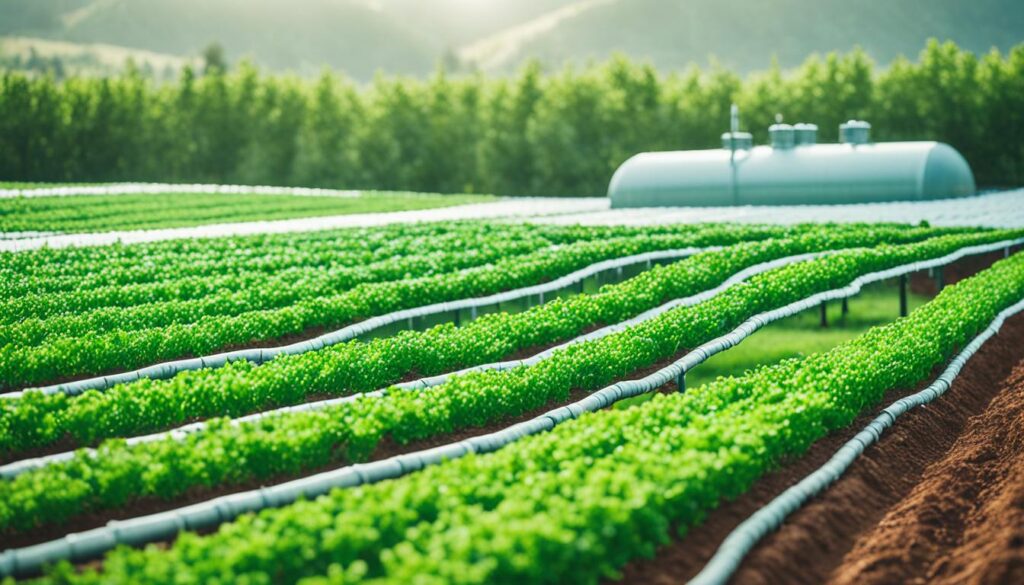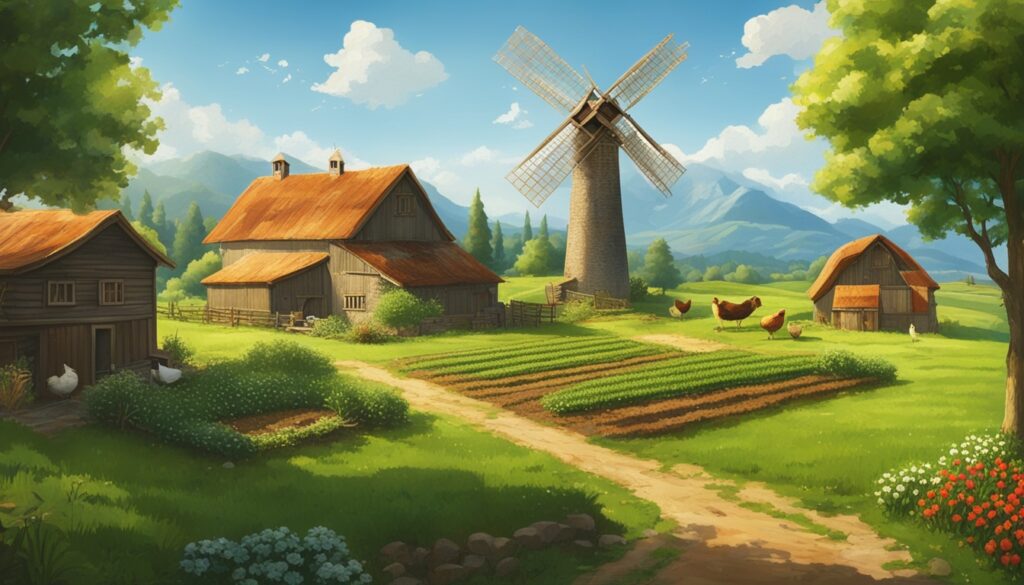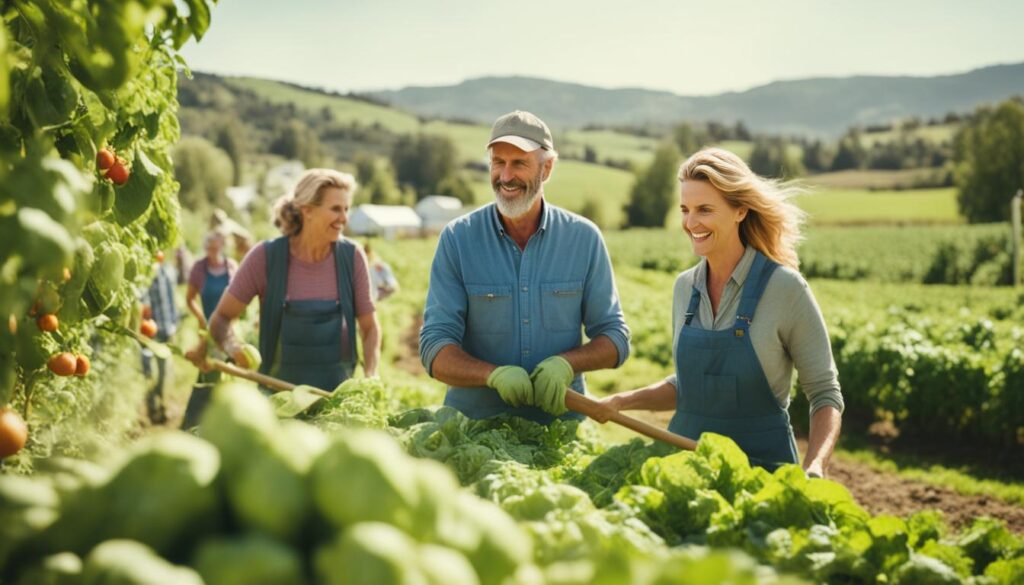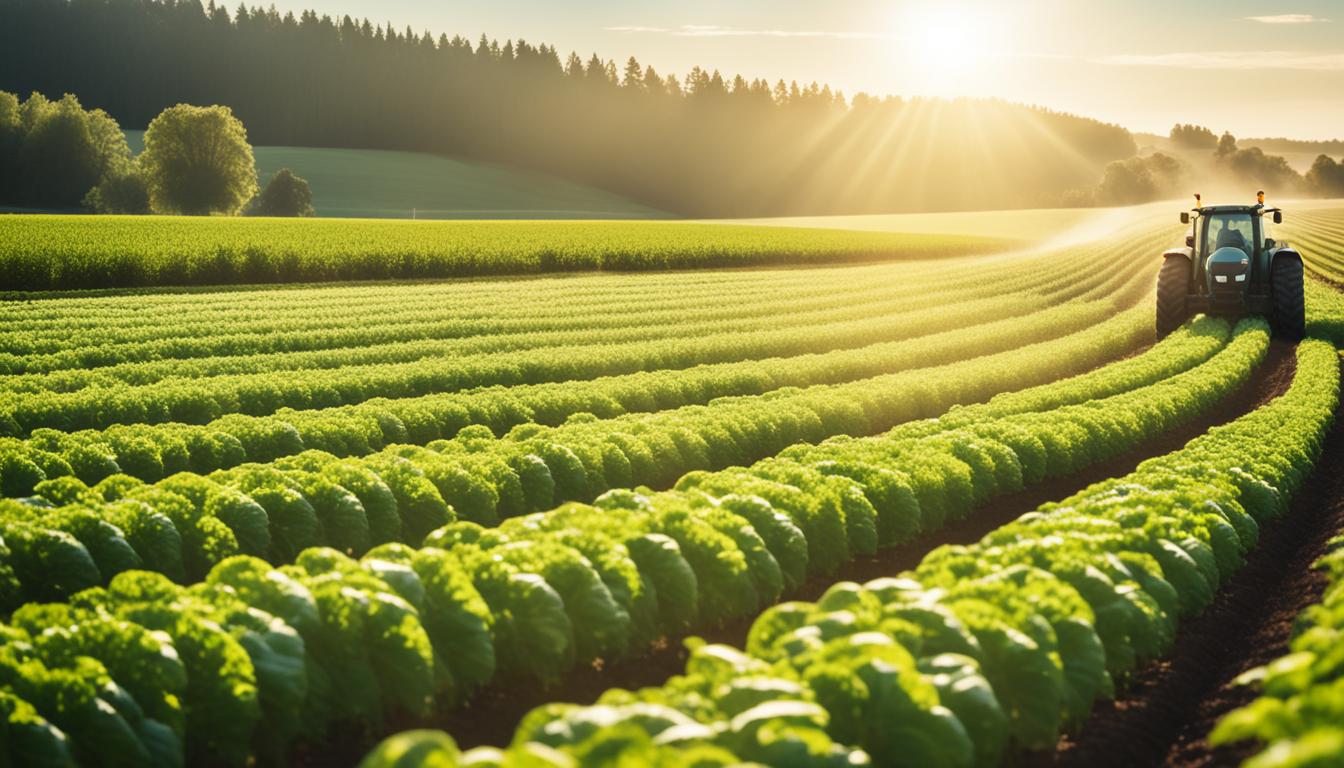In today’s world, we all worry about the environment. Organic farming is a key solution to many environmental issues. It uses natural methods and avoids synthetic chemicals. By choosing organic farming, you help make our planet greener and healthier.
Organic farming is more than just a way to farm. It’s a complete approach that works with nature. By using natural fertilizers and crop rotation, organic farmers lower their carbon footprint. They also keep the soil healthy and support many different plants and animals. This is good for the planet and gives us food that’s safe and tastes great.
Looking into organic farming, you’ll see many benefits. It cuts down on harmful gases, saves water, and reduces pollution. Organic farming protects our natural world. By supporting organic farmers and eating organic food, you help make a better future for our planet.
Embracing Sustainable Agriculture
Organic farming is all about living in harmony with nature. It’s a way of farming that respects the balance of our ecosystem. Organic farmers use natural methods to keep the soil healthy and save water.
Exploring Nature’s Bounty
Organic farming celebrates nature’s diversity. It grows many different crops that do well in their natural settings. By working with nature’s cycles, farmers can grow food that is free from chemicals and full of nutrients.
This method not only feeds the land but also helps local wildlife. It creates a healthy, balanced system that keeps giving.
Respecting Earth’s Resources
- Organic farmers take care of the soil. They use things like crop rotation and composting to make it rich and fertile.
- They also focus on saving water. Organic farmers use smart ways to water crops and manage water well.
- By not using harmful chemicals, organic farming keeps our water clean. This protects the environment and the people living nearby.
Organic farmers show great respect for the Earth. They know how important it is to take care of our resources. They understand the balance that supports life on our planet.
Environmental Benefits of Organic Farming
Organic farming brings many environmental benefits that go beyond just the farm. It helps reduce pollution, boost biodiversity, and keep soil healthy. By using sustainable methods, organic farmers are key in fighting pollution and protecting our soil.
Organic farming is great at reducing pollution. It avoids synthetic fertilizers and pesticides that harm water and ecosystems. Instead, it uses natural, safe options. This keeps our water clean and protects our ecosystems.
It also promotes biodiversity. Organic farms become homes for many plants and animals. Without harmful chemicals, they welcome pollinators and wildlife. This makes the environment rich and healthy.
Organic farming keeps soil healthy by adding nutrients naturally. It doesn’t use synthetic fertilizers that can harm the soil. Instead, it uses crop rotation and composting. This keeps the soil fertile and prevents erosion, making the land sustainable for the future.
“Organic farming is not only a way of life, but a way of preserving our planet for future generations. By embracing these sustainable practices, we can create a healthier, more resilient environment for all to enjoy.”
Reducing Carbon Footprint
Organic farming is great for the environment because it cuts down on the carbon footprint of farming. It uses fewer synthetic fertilizers and pesticides. This helps lower greenhouse gas emissions and fight climate change.
Minimizing Greenhouse Gas Emissions
Regular farming often uses a lot of synthetic stuff, like nitrogen fertilizers. These can release a strong greenhouse gas called nitrous oxide. Organic farming uses natural stuff like compost and animal manure instead. This cuts down on synthetic fertilizers and helps keep carbon in the soil.
Organic farming also uses cover crops and does less tillage. Cover crops keep soil carbon in place. Less tillage means less soil disturbance, so more carbon stays in the ground.
| Farming Practice | Impact on Greenhouse Gas Emissions |
|---|---|
| Reduced use of synthetic fertilizers | Lowers nitrous oxide emissions |
| Use of compost and manure | Helps sequester carbon in the soil |
| Cover cropping | Retains soil carbon |
| Reduced tillage | Minimizes soil disturbance and carbon release |
By using these sustainable methods, organic farming can greatly reduce the carbon footprint of farming. This helps fight climate change.
“Organic farming is not only good for the environment, but it’s also a powerful tool in the fight against climate change. By minimizing greenhouse gas emissions and sequestering carbon in the soil, organic farmers are playing a crucial role in protecting our planet for future generations.”
Preserving Soil Health
Organic farming focuses on keeping the soil healthy. It uses sustainable methods to make the soil richer and more diverse. This helps the land become more productive and resilient.
Nurturing Life-Giving Earth
At the heart of organic farming is the goal to keep the soil healthy. By adding compost and cover crops, and disturbing the soil less, farmers boost the soil’s organic matter. This is key for the many living things in the soil.
- Compost improves soil structure and adds nutrients, helping soil microbes and earthworms.
- Cover crops prevent soil erosion, fix nitrogen, and add organic matter when tilled in.
- Less tillage lets soil life balance out, helping good organisms to grow.
Organic farming helps the earth by using sustainable soil management methods. This keeps the soil healthy and productive for a long time. It makes farming systems strong and healthy.
“Healthy soil is the foundation for sustainable, productive agriculture. Organic farming practices protect and nourish this vital resource, ensuring a bountiful future for generations to come.”
Promoting Biodiversity
Organic farming is more than just growing healthy, chemical-free crops. It’s key to boosting biodiversity and keeping natural ecosystems safe. By skipping synthetic chemicals and choosing sustainable ways, organic farmers make homes for many plant and animal species.
Organic farming boosts biodiversity with crop rotation and intercropping. Instead of growing just one crop, farmers plant many different ones. This draws in lots of helpful insects, pollinators, and wildlife. This variety keeps natural ecosystems balanced, helping many species survive that might not make it with regular farming.
- Organic farming creates habitats for a wide range of plant and animal species
- Crop rotation and intercropping support diverse populations of beneficial insects and pollinators
- Organic farms help preserve natural ecosystems and promote the overall health of the environment
Choosing organic farming makes a big difference for our planet. It’s good for the environment and helps our food systems last longer. As we work to protect our natural ecosystems, organic farming shows us a green solution that fits with nature’s flow.
Water Conservation in Farming
Organic farming is key to saving water and managing it sustainably. By choosing organic farming, you help protect our precious water and cut down on pollution from traditional farming.
Stewarding Precious Water Resources
Organic farmers save water in many ways. They grow crops that need less water, easing the burden on our water supply. They also use smart irrigation systems that send water right to the roots, cutting down on waste.
Organic farming also makes soil healthier, which helps it hold onto moisture better and lose less water. By using cover crops and compost, and keeping the soil undisturbed, farmers can use less water for irrigation.
| Water Conservation Practices in Organic Farming | Conventional Farming |
|---|---|
|
|
Organic farmers use these methods to help manage water wisely. This ensures a sustainable future for farming and the planet.

Chemical-Free Crop Cultivation
Organic farming is all about growing crops without synthetic chemicals. As an organic farmer, you work with nature’s cycles. You use natural ways to control pests and improve soil. This method is good for the planet and gives you tasty, healthy food.
Embracing Nature’s Rhythms
Organic farmers don’t use harsh chemicals. They work with the earth’s natural cycles. They use crop rotation, cover cropping, and planting together to keep soil healthy and balanced. This way, they create a system that needs little outside help.
- Crop rotation: Rotating crops to stop diseases and pests, and to add nutrients to the soil.
- Cover cropping: Planting cover crops to improve soil, stop weeds, and prevent erosion.
- Companion planting: Putting plants together to help each other, like keeping pests away or attracting good bugs.
By working with nature, organic farmers grow crops that are good for the earth and full of flavor and nutrients.
Natural Pest Control Methods
Organic farmers don’t use synthetic pesticides. They use natural ways to keep pests away from their crops. This includes using helpful insects, organic repellents, and barriers.
| Natural Pest Control Method | Description |
|---|---|
| Beneficial Insects | Releasing ladybugs, lacewings, and other helpful insects that eat common pests. |
| Organic Pest Repellents | Using things like neem oil, garlic, or diatomaceous earth to keep pests away safely. |
| Physical Barriers | Using row covers, mulch, or natural fences to keep pests from getting to the crops. |
By using these natural pest control methods, organic farmers keep their crops healthy. They also protect the local ecosystem’s balance.
Natural Pest Control Methods
In organic farming, natural pest control is key. It’s a green way to fight pests and diseases. This method protects the environment and cuts down on harmful chemicals.
Organic farmers use beneficial insects to control pests. Ladybugs, lacewings, and parasitic wasps eat pests. This natural method keeps crops safe without chemicals. It helps create a healthy ecosystem for crops to grow.
- Crop rotation is a great way to fight pests. By changing what crops are grown in a field, it makes it hard for pests to survive. This keeps pests from causing big problems.
- Physical barriers like row covers and netting stop pests from getting to crops. These barriers act as a barrier, keeping insects away without using harmful chemicals.
Using these natural methods, organic farmers help the environment and make the land healthier. This approach is good for crops and the whole ecosystem. It helps keep nature in balance and supports biodiversity.
“Organic farming is not just about the food we produce; it’s about the health of our planet and the well-being of future generations.”
Minimizing Pollution from Farming
As a conscious consumer, you might know about the harm traditional farming can cause. Traditional farming often uses chemicals like fertilizers and pesticides. These can pollute the soil and water. But, there’s a better way: organic farming.
Safeguarding Our Ecosystems
Organic farming takes a holistic view of farming. It aims to cut down on pollution and keep our ecosystems healthy. By avoiding synthetic chemicals, organic farming reduces harmful runoff into water. This keeps plants and animals safe.
- Organic farming uses fewer chemicals, lowering the chance of polluting water.
- It helps nutrients cycle naturally, keeping soil healthy and cutting down on chemical use.
- Methods like crop rotation and cover cropping protect soil from erosion and keep it fertile without chemicals.
Choosing organic farming helps in minimizing pollution from farming and protecting ecosystems. It makes a big difference in your community and the world.

“Organic farming is not only a more sustainable and environmentally-friendly approach to agriculture, but it also produces healthier, more nutritious foods that are better for our communities and the planet.”
How Can Organic Farming Help the Environment
Organic farming is more than a trend; it’s a way to farm that’s good for our planet. By using organic methods, farmers can tackle some big environmental issues we face today.
Organic farming cuts down on carbon emissions by using fewer synthetic fertilizers and pesticides. These chemicals are big contributors to greenhouse gases. Organic farmers use natural sources for nutrients and pest control instead. This helps keep carbon in the soil and lowers emissions.
Organic farming also boosts biodiversity by supporting many plant and animal species. These diverse ecosystems on organic farms are homes for pollinators and other wildlife. They’re key for a healthy environment.
- Organic farming keeps soil healthy by adding nutrients and preventing erosion. This makes the land good for farming in the future.
- It also saves water by using smart farming practices. This helps with water scarcity and protects our water bodies.
- Organic farming doesn’t use harmful chemicals. This lowers pollution risks and keeps the environment safe.
The benefits of organic farming are big and well-known. By choosing sustainable farming, we can make our planet healthier. We also help ensure a secure food future for everyone.
| Environmental Benefit | Impact of Organic Farming |
|---|---|
| Carbon Footprint Reduction | Less synthetic fertilizers and pesticides mean less greenhouse gas emissions. |
| Biodiversity Promotion | Supports many plant and animal species, helping pollinators and wildlife. |
| Soil Health Preservation | Adding nutrients and preventing erosion keeps the land fertile for the future. |
| Water Conservation | Smart farming practices help save water and protect our water resources. |
| Pollution Reduction | Not using harmful chemicals lowers the risk of contamination and damage to the environment. |
Choosing organic farming is a big step towards a sustainable food system. The benefits are clear, and the impact on our planet can be huge.
“Organic farming is not just a choice, it’s a responsibility we have to our planet and future generations.”
Sustainable Agriculture Practices
Organic farming is all about working with nature, not against it. Farmers use eco-friendly methods to make a good relationship between their crops and the environment. Let’s look at some ways organic farming helps the planet.
Crop Rotation for Soil Health
Organic farmers use crop rotation to keep the soil healthy. They plant different crops one after another. This stops pests and weeds, cuts down on chemicals, and keeps the soil fertile.
Cover Cropping and Green Manures
Organic farmers also use cover crops and green manures. These plants help protect the soil, add nutrients, and fix nitrogen. This keeps the land balanced and supports sustainable agriculture practices and harmony with nature.
Natural Fertilizers and Amendments
Organic farmers prefer natural fertilizers like compost and manure. These help plants grow strong and improve the soil. By choosing natural farming methods, they create healthy ecosystems where everything works together well.
“Sustainable agriculture is not just about the food we grow, but the way we grow it – in harmony with nature, not against it.”
Organic farmers show their love for the earth with sustainable agriculture practices. They take care of the land and follow nature’s cycles. This leads to a greener, more sustainable future for us all.
Empowering Local Communities
Organic farming is great for the environment and helps local communities too. It supports small farmers and sustainable farming. This approach feeds the land and the people who live off it.
Organic farming gives small farmers economic chances. Big farms often push out small ones. But, organic farming values small, diverse farms. This lets local farmers grow quality food and make a good living.
- Supporting small organic farmers helps rural areas grow and supports sustainable development.
- Local organic produce cuts down on transportation, making food more secure and reducing environmental harm.
- Organic farming’s focus on nature also helps the community by saving natural spaces and improving life quality.
Organic farming also builds a strong bond between people and the earth. By using nature’s ways and avoiding synthetic stuff, farmers show deep respect for the Earth. This attitude helps the community take care of their land and food systems.
“Organic farming is not just about growing food – it’s about growing communities, too. By supporting small farmers and promoting local, sustainable agriculture, we can empower rural areas and build a more resilient, equitable food system.”
As more people want organic, locally grown food, organic farming is changing things for the better. It helps small farmers and local food systems. This way, organic farming is key to a sustainable, fair future for everyone.

Nutritious and Flavorful Produce
Organic farming is great for the planet and gives us produce full of flavor and nutrients. Organic farmers work with nature to grow organic produce that truly shows the land’s best. This way, we get food that’s not just healthy but also tastes amazing.
Savoring Nature’s Bounty
Organic fruits and veggies, like juicy tomatoes and crisp greens, are a treat for your taste buds. Organic farming lets crops grow to their fullest flavor potential. This means you get a taste that’s unmatched by regular produce. Plus, organic food is full of vitamins, minerals, and antioxidants because farmers focus on health, not looks.
| Organic Produce | Nutritional Value | Flavor Profile |
|---|---|---|
| Heirloom Tomatoes | High in vitamins A and C, lycopene, and potassium | Sweet, tangy, and bursting with natural tomato flavor |
| Kale | Rich in vitamins K, A, and C, as well as fiber and iron | Earthy, slightly bitter, and wonderfully crisp |
| Blueberries | High in antioxidants, fiber, and manganese | Juicy, sweet, and with a delightful burst of tartness |
When you pick organic produce, you’re helping local agriculture and enjoying real nature’s flavors. Taste the earth’s goodness and see how organic farming makes a difference.
Ethical and Humane Practices
Organic farming is more than just sustainable food production. It’s about treating animals well, paying fair wages to workers, and being socially responsible. At its core, organic farming values animal welfare, fair labor, and social responsibility.
Choosing organic means supporting farming that cares for animals. Organic farmers make sure animals have enough space, natural light, and food that suits their needs. This approach ensures animals live a good life.
- Organic farms follow strict rules to protect animal welfare. This means animals are not kept in small spaces or stressed out.
- Organic farmers handle animals kindly and don’t use growth hormones or antibiotics unless really needed.
- Animals get to act naturally, which helps them stay healthy and happy.
Organic farming also means treating farm workers right. Organic farmers work with their communities, offering steady jobs and caring for their workers and their families.
“Organic farming is not just about the food – it’s about creating a better world for all of us, including the animals and the people who work the land.”
By picking organic, you support organic farming, ethical practices, animal welfare, and sustainable agriculture. It’s a way of farming that looks after the planet, its people, and aims for a fairer food system.
Organic Farming: A Holistic Approach
Nurturing Life, Preserving Nature
Organic farming is a way to care for life and protect nature. It uses sustainable methods to make a system that helps the land and people. This approach cuts down pollution, boosts nature’s variety, keeps soil healthy, and saves water.
At its core, organic farming means working with nature, not against it. Farmers use natural ways to care for their land, like rotating crops and using natural pest control. This reduces harm to the environment and builds soil that supports life.
Choosing organic farming helps keep our world in balance. When you pick organic food, you feed your body and support a caring way of farming. Join the movement for a greener, stronger future by embracing organic farming.


